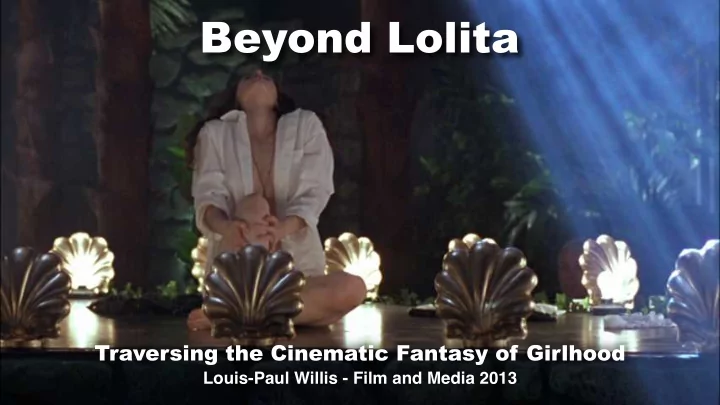

Beyond Lolita Traversing the Cinematic Fantasy of Girlhood Louis-Paul Willis - Film and Media 2013
Aim Distinguish two forms of cinema: 1. Fantasmatic cinema: ‣ Reactionary, ideologically alligned 2. Analytic cinema: ‣ Radical, new forms of spectatorship
PLAN 1. Pertinence of contemporary Lacanian film theory 2. Fantasmatic cinema v/s analytic cinema 3. “Look closer”: American Beauty (Mendes, 1999) 4. Beyond fantasy: Exotica (Egoyan, 1994)
1. Contemporary Lacanian Film Theory 1. Contemporary Lacanian Film Theory • Traditional Lacanian film theory’s misconceptions: ‣ GAZE = active, subjective and objectifying ‣ DESIRE = desire for mastery ‣ Not aligned with Lacan’s definition of these concepts
1. Contemporary Lacanian film theory 1. Contemporary Lacanian Film Theory • “The Lacan who served as a point of reference for these theories was the Lacan before the break” - Slavoj Ž i ž ek, “The Undergrowth of Enjoyment” • “For Lacan, psychoanalysis at its most fundamental is not a theory and technique of treating psychic disturbances, but a theory and practice that confronts individuals with the most radical dimension of human existence” - Slavoj Ž i ž ek, How to Read Lacan
1. Contemporary Lacanian film theory 1. Contemporary Lacanian Film Theory • Desire = desire for a prohibited/impossible object • “Lacan claims that an object becomes the object of desire only in so far as it is prohibited (there is no incestuous desire prior to the prohibition of incest) -- desire itself needs Law, its prohibition, as the obstacle to be transgressed” - Slavoj Ž i ž ek, The Metastases of Enjoyment
1. Contemporary Lacanian film theory 1. Contemporary Lacanian Film Theory • Fantasy: ‣ An attempt to mitigate trauma ‣ Provides an imaginary access to the object of desire (objet petit a) • “Fantasy has come to mean the making visible, the making present, of what isn’t there, of what can never directly be seen” - Elizabeth Cowie, Representing the Woman
1. Contemporary Lacanian film theory 1. Contemporary Lacanian Film Theory • “Fantasy is able to provide the subject a relation to the impossible object because of the form that fantasy takes, a form that makes is especially amenable to the cinema” - Todd McGowan, The Real Gaze
1. Contemporary Lacanian film theory 1. Contemporary Lacanian Film Theory • “Cinema is the ultimate pervert art. It doesn’t give you what you desire, it tells you how to desire” - Slavoj Ž i ž ek, The Pervert’s Guide to Cinema
2. Fantasmatic/Analytic Cinema • Popular cinema = fantasmatic cinema (generally) ‣ Happy ending = fantasy • “The brief nature of the common Hollywood ending allows for the fantasy of resolution to remain especially strong as it provides a glimpse of the ultimate satisfaction but does not have to reveal what happens after the momentary conclusion” - Hilary Neroni, “Jane Campion’s Jouissance”
2. Fantasmatic/Analytic Cinema • Traversing the fantasy: ‣ Marks the end of analysis ‣ Subject confronts the lack beyond fantasy ‣ Traumatic • “The drive is what remains of desire after the image of realization [i.e. the fantasy] has been stripped away”. - Todd McGowan. Out of Time: Desire in Atemporal Cinema
2. Fantasmatic/Analytic Cinema • Analytic cinema: ‣ Brings viewer to traverse a given fantasy ‣ Confronts spectators to their fantasies
2. Fantasmatic/Analytic Cinema • Analytical cinema: ‣ Produced by major studios (American Beauty) OR ‣ Produced by independent studios (Exotica)
3. “Look closer”: American Beauty • “Fantasy involves [...] the arranging of, a setting out of, desire; a veritable mise en scène of desire” - Elizabeth Cowie, Representing the Woman • Filmic rendition of Lester’s fantasizing: ‣ Cheerleader’s uniform ‣ Shift in soundtrack ‣ Filming and lighting of the strip-tease ‣ Angela’s wink
American Beauty (Mendes, 1999)
American Beauty (Mendes, 1999)
American Beauty (Mendes, 1999)
3. “Look closer”: American Beauty • Barbra Ann Churchill. The Lolita Phenomenon ‣ PhD thesis ‣ Posits the sexualized young girl as a “child (femme) fatale”
4. Beyond fantasy: Exotica • Particular aspects of the Exotica nightclub: ‣ Owned by a woman; managed with “family values” ‣ Highly sophisticated decoration; exoticism of nature/femininity ‣ Staging of performances ‣ Eric (DJ): narrative support for the collective male fantasy
4. Beyond fantasy: Exotica • “Within [its] imaginary isolation, one seems not to have to sacrifice the object. One is able to enjoy it, but with the restriction that one can only enjoy the image of the object, not the object itself” - Todd McGowan, The End of Dissatisfaction? • “Fantasies cannot bear the revelation of speech” - Jacques Lacan, Seminar VII
4. Beyond fantasy: Exotica • Fantasy: ‣ Veils the lack in the Other ‣ Answers the enigma of “che vuoi?” (What to you want from me?) ‣ Maps out our desires
Recap • Fantasmatic cinema: ‣ Perpetuates the logic of fantasy • Analytic cinema: ‣ Provides a “counter-spectatorship” where fantasies are traversed
Traversing Screen Fantasies The Radicality of Contemporary Film Spectatorship Louis-Paul Willis - FSAC 2013
Recommend
More recommend